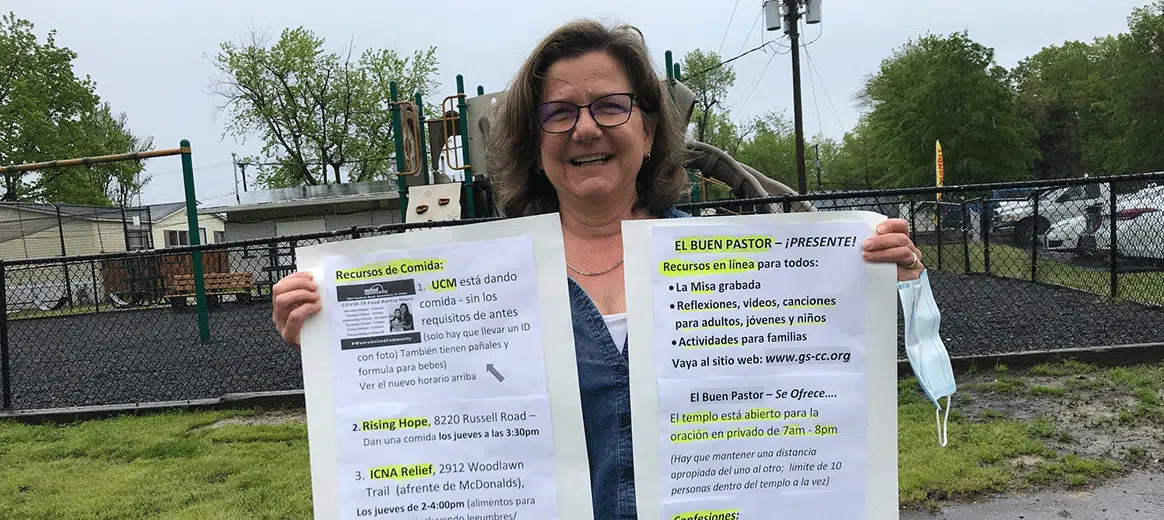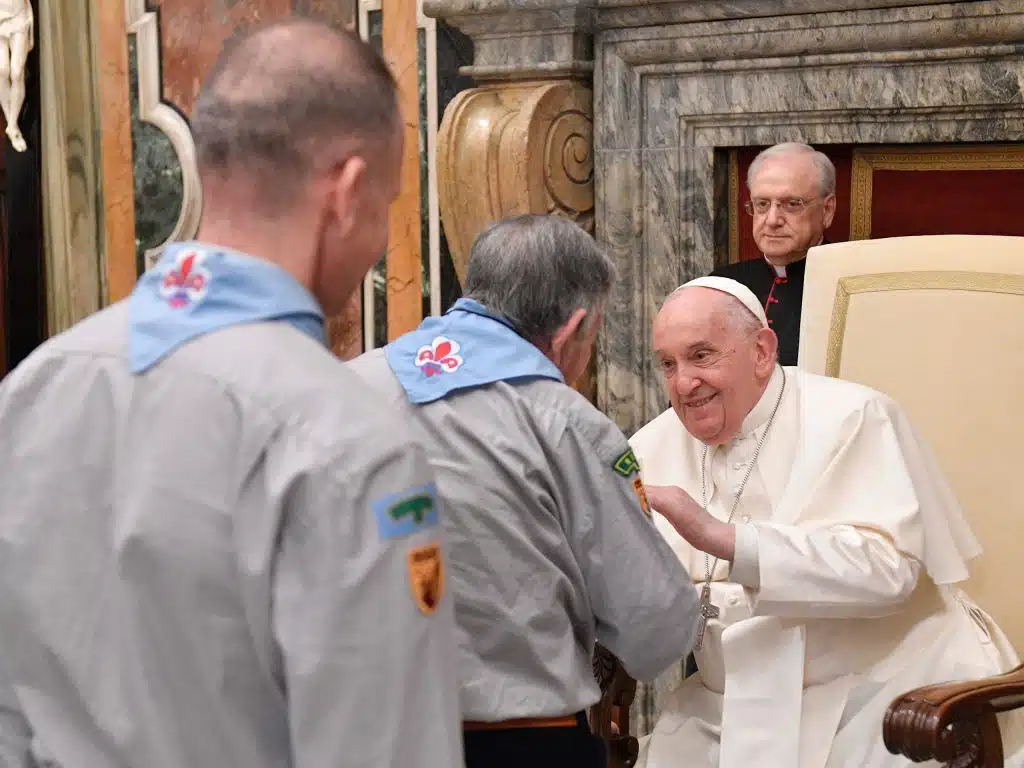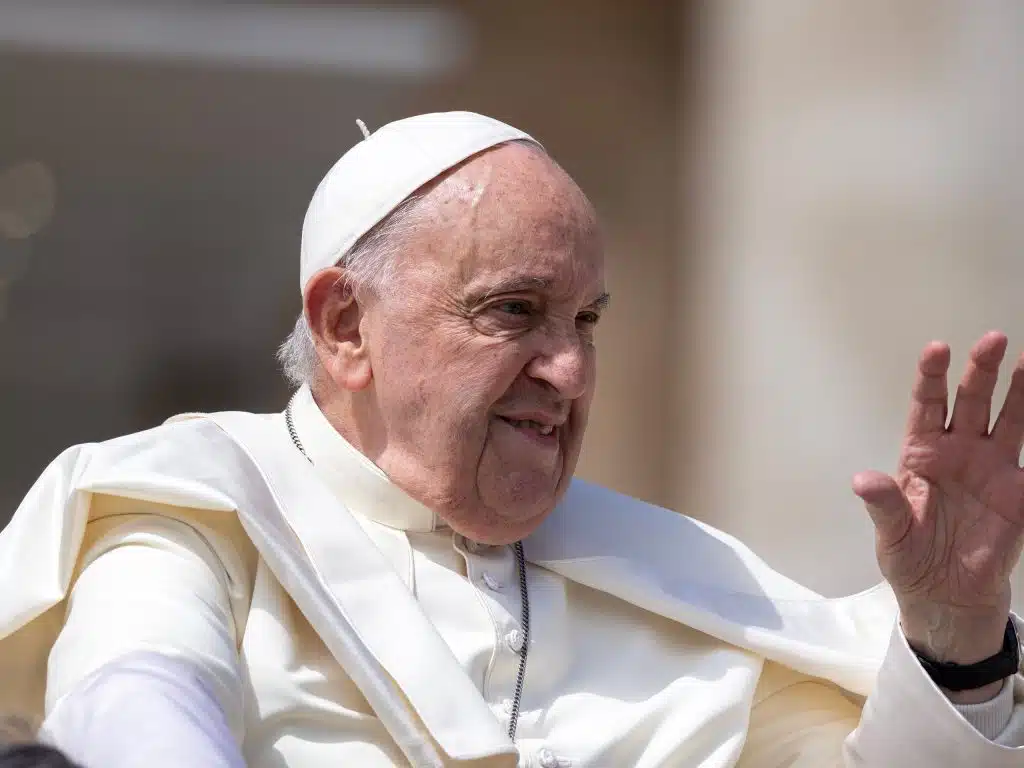There’s so much Leah Tenorio wants to communicate. That the local food pantry has made it easier for whoever needs food to receive it. That there’s counseling available for those feeling dejected or overwhelmed. That there are lots of spiritual resources in Spanish on the website of Good Shepherd Church in Alexandria.
But she can no longer rely on after-Mass announcements, paper bulletins or face-to-face conversations, some of the most effective ways she’s been reaching out to people. So Tenorio, the director of Hispanic ministries at Good Shepherd, is relying primarily on emails sent from Good Shepherd Hispanic leaders and one-on-one phone calls with parishioners to disseminate information on how the parish can help in this time of unprecedented need.
She not only wants people to find help, but for them to know their parish supports them. For example, “when people go to the food pantry at United Community, they don’t see a sign that says ‘Good Shepherd brought this food here,’ ” she said. “They don’t realize that and if they’re not online, then I hear them say, ‘What is Good Shepherd doing? Where is Good Shepherd?’ ”
It’s been a trying time for many in the immigrant community in numerous ways, said Tenorio. While many are protected from eviction, those who rent a room and are unable to pay are at risk for homelessness. “Oftentimes, the person who is renting the room doesn’t have the money to pay their own rent if they don’t have that renter. So it’s not like they’re just being mean — it’s a chain effect,” said Tenorio. Families without internet are dropping off their kids at households with internet access so they can attend virtual school.
Perennial problems such as access to transportation or the ability to afford food have been exacerbated. Most of the Hispanic immigrants Tenorio knows are not eligible for unemployment benefits or other government assistance.
“Little by little people are starting to lose their jobs or have diminished hours. There’s a lot of stress about money. Each week that’s gone by, it’s gotten more and more acute,” said Tenorio. “On the other side of that, I’m working with agencies, other nonprofits and religious institutions to figure out how we can continue to help with financial assistance. Nobody really knows how we’re going to be able to do it.”
While the parish is open for confession and private prayer, the faith community can’t gather in large numbers as they would in other times of tragedy or personal loss. “It used to be that if somebody’s mother died in Mexico, what helped them with their grief was to be able to come to church and put that intention in the Mass. Without having the ability to come to Mass to get that comfort that they need, that’s just another layer (of difficulty),” both for the parishioners and the parish staff trying to serve them, said Tenorio. Still, “most of the Hispanic parishioners have an attitude that they trust in God’s divine providence, that he’ll help them through.”
Hispanic parishioners at Christ the Redeemer Church in Sterling are facing similar problems. “We have a huge population at our parish of hourly employees who are affected much (more) than many others. That tends to hit the Hispanic community a little more,” said Father Joel D. Jaffe, pastor. “I’ve been begging people to give to the poor box first and then if they can also still give something to the church, to give something to the church as well.”
Before the pandemic, the parish distributed $1,500-$2,000 a week to those needing money for rent, utilities and transportation. Now, it’s giving out $7,000. LINK, the local ecumenical food pantry, typically fed 40-50 families a week. Now it’s serving 300.
Though the need is tremendous, so is the generosity. The Sterling parish’s Hispanic young adult group is sorting and delivering food for LINK, as many of the normal volunteers are high risk. People are donating money as well as time. “Our Hispanic families, I’ve been reaching out to them to see if they need anything,” said Father Jaffe. “People who aren’t working, who are just burning down their savings are telling me, ‘Well, Father, we’ll donate some more money to the church if there are people more in need than us.’ I have to convince them not to.”
At St. Gabriel Mission in Manassas, Father Juan A. Puigbó believes lack of information or misinformation about the risks of coronavirus have led to a high number of COVID-19 cases among the Hispanic community. “We already had several deaths in our mission, and we have several families who are sick, the entire household,” he said. “I have been calling them, we pray over the phone. Even those who are sick, (they say,) ‘We are going to Mass virtually every day, God is taking care of us and he’s in control.’ This is a lesson of people who really want to love the Lord and want to be loved by him.”
As with many priests, Father Puigbó has had to embrace technology in order to connect with his parishioners. “I began doing daily rosary and daily Mass (online) and then night prayer, trying to give a structure through prayer to our families. We went from 200 subscribers on the YouTube page to now we have like 1.4K,” he said. “I have for years been refusing to do anything with social media and now Father (Lee R.) Roos (pastor of All Saints Catholic Church in Manassas) is very proud because he is so into technology.”
Throughout the weeks, Father Puigbó has seen people return to the faith and grow in the faith, taking up St. Peter’s challenge to be joyful in times of suffering. “It’s been difficult, of course, in terms of access to ordinary aspects of life, but it’s been a blessing and an opportunity to learn that our faith is something that accommodates our reality,” he said. “It’s not, ‘Let me live my faith according to my standards in my cozy, nice situation.’ We embrace this with God in our hearts.”



